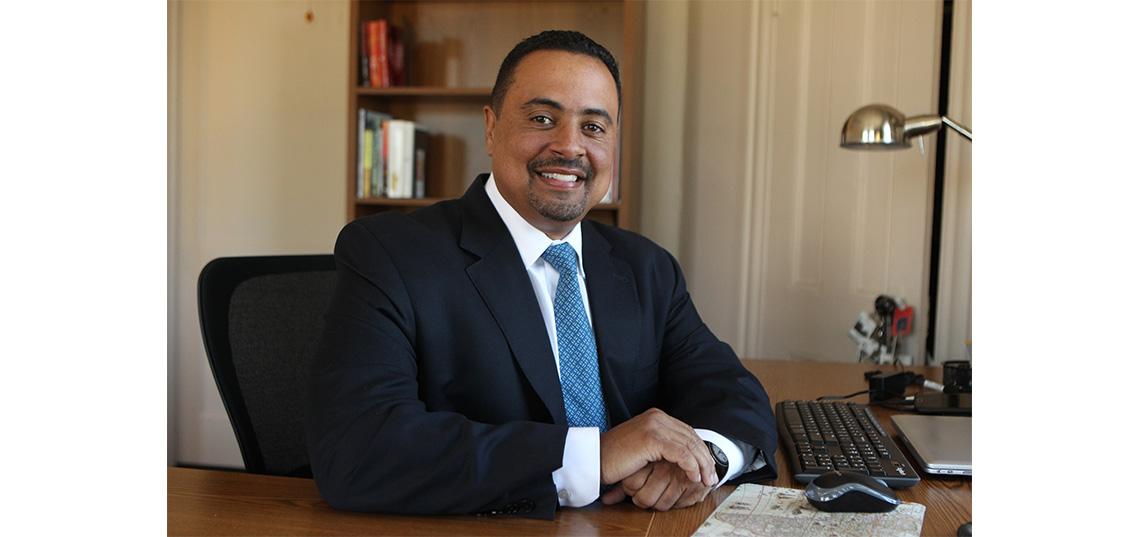
With his academic experience, which includes a bachelor’s degree in mathematics and computer science, and graduate training from the University of Michigan which includes an MBA, an MSW, and a Ph.D. in Information Science, Assistant Professor of Library and Information Science Charles Senteio is dedicated to interdisciplinary research which helps address complex and intersecting issues pertaining to health equity.
Given his professional experience, academic training, and health research expertise, the Rutgers Global Health Institute invited Senteio to join its faculty as a core member effective the beginning of the spring 2020 semester. This role enables him to support the efforts of the institute, connect with other members, and to brainstorm ideas.
As an assistant professor, Senteio focuses on three key areas— research, teaching, and service. Across all three areas he applies his expertise and experience to improve chronic disease outcomes for underrepresented populations. These populations include ethnic minorities, immigrants, and formerly incarcerated persons.
Some of the research projects he is currently supporting include collaborations with the Rutgers Cancer Institute of New Jersey (RCINJ) and a non-profit organization, Jazz for Prostate Cancer Awareness (Jazz4PCA). Together, they are expanding current research collaborations to include developing technologies to help underrepresented populations, specifically African American men with prostate cancer, in order to enhance their participation in selecting the treatment best for them..
Another project Senteio is leading includes partnering with Lazos America Unida, the Robert Wood Johnson hospital, and the New Brunswick Free Public Library. He is working closely with Teresa Vivar, Lazos’ founding Executive Director, to better understand the health information needs of Hispanic populations in New Brunswick. For example, they are currently investigating how to provide culturally appropriate health information to determine eligibility for health insurance, environmental health risks, and context for preventative screening. They are also exploring health information needs considering the profound impact of COVID-19 on communities that already experience persistent health inequity.
For this project, Senteio interviewed several current SC&I students, and recently hired one to join the project as a research assistant supporting data collection and analysis. So far, the project has conducted two of the projected ten focus groups. This project is funded through the Rutgers Community Design for Health and Wellness Interdisciplinary Research Group.
Since joining SC&I in the fall 2016, he has taught courses in the Information Technology and Informatics (ITI) program and the Master of Information (MI) program. He will teach a Byrne seminar focused on engaged scholarship in urban communities, and he is actively planning to teach new courses at SC&I which incorporate his health equity translational research and engaged scholarship.
Senteio is involved in service work across SC&I, Rutgers, and the larger health equity research community. For example, he is a founding steering committee member for RU-H.E.A.R. (Rutgers University - Health Equity Academic Researchers). The organization brings together health researchers across Rutgers to, according to their website, “create research collaborations, community-based partnerships and connections that result in competitive grants and publications.” He also serves as the communications chair and membership co-chair for the American Public Health Association’s (APHA) Health Informatics Information Technology (HIIT) section. At the November, 2019 APHA National Conference, he was awarded the HIIT Outstanding Leadership Award for Service for 2019.
When asked how SC&I supports his research, Senteio said SC&I provides a vibrant academic home which enables him to advance health equity investigations. Specifically, the school has facilitated numerous connections with the SC&I faculty and across Rutgers.
“Faculty at SC&I have helped me develop collaborations with other parts of Rutgers, and beyond, which are vital in doing engaged health equity work,” said Senteio. “I have relied on various faculty and peers to help make decisions about what projects and areas of health equity research to pursue.”
Senteio asserted that the Academy does not have a dedicated department or school for health equity research. Senteio highlights one of the key characteristics which distinguishes SC&I, “SC&I has an established foothold in academic disciplines pertinent to health equity research, specifically information science and health communication. Researchers in these areas have established collaborative relationships across the University, such as in the school of public health, the school of social work, the Institute for Health, Health Care Policy and Aging Research, the RCINJ, and, the Rutgers Robert Wood Johnson Medical School,” he said.
